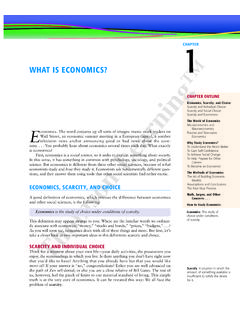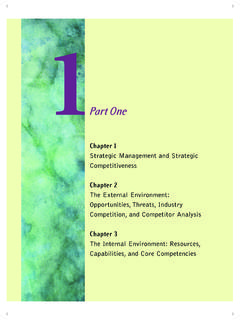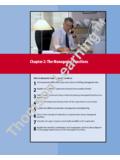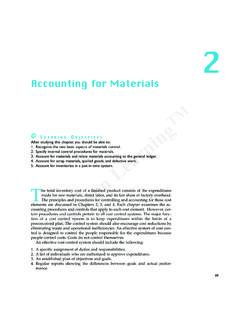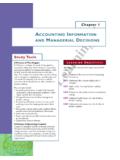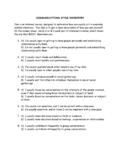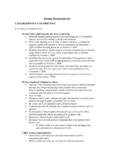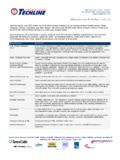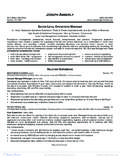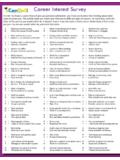Transcription of WORKSHOP Workplace Interaction - Cengage …
1 KnowingYour PlaceBy not takingother people sneeds andopinions intoaccount, Carasounds like oflecturing staffmembers,demandingtasks accom-plished withoutprior notice, orbeing the soleinput on anadvisory board,Cara shouldwork to encour-age others opinions andsuggestions. The number-one Workplace fact of life is that you have to get along witheveryone you work with. Whether it s the CEO, your line supervisor, oryour cubicle mate, you must interact pleasantly, effectively, and appro-priately. And getting along doesn t mean just keeping quiet and doingyour job. Today s employees are required to be active participants in theworkplace. This WORKSHOP examines the importance of using effectivecommunication to maintain good interpersonal relations at work.
2 Morethan any other talent or ability, strong communication skills could bethe key to advancing your career. 2 Communication 2000 Interpersonal CommunicationWORKSHOPWORKSHOP11 Learn the importance of getting along with the value ofgood supervisor-employee relations invarious Knowing Your PlaceAfter two weeks as the assistant clothingbuyer at an upscale department store,Cara is completing her tasks in recordtime. Yet, she can t ignore the feelingthat her coworkers don t like Cara tells a coworker everythingshe knows about the latest fashions, sheis ignored. When she tells the floormanager to complete an inventory of all outerwear by the end of the day, the twoof them get into an argument.
3 When hersupervisor asks her to head up an advi-sory team made up of employees fromdifferent departments, no one else isinvited to or encouraged to talk or makeany could Cara do toimprove the way shecommunicates with coworkers? Getting Along 2001 PhotoDisc, Commu-nicationResources Video (24:00) CD-ROM Study Guide Instructor s Resource CD-ROM WebTutor ExamView Pro Testing Teacher 10/19/01 3:03 PM Page 2It s Not What You Say, It s How You Say ItYour coworkers will be more receptive to what you have to say when you takecare to deliver your message appropriately. Be a strong fellow employees will be interestedin your ideas when you show genuine interest in their ideas it s atwo-way street.
4 Check your body smiling face and open posture con-vey interest, while crossed arms and a frown send negative forward and make eye contact as often as possible. Use I the word you to point out problemsputs people on the defensive. Instead of saying, You made me feellike a fool when you pointed out my mistake, try saying, I wasembarrassed when my mistake was pointed out in that way. Validate the other person s others that you under-stand and respect what they re saying. For example, try restatingwhat you ve just been told: It seems that answering the telephoneis taking too much of your time. Validation helps minimize con-flict and encourages others to be more receptive to what you haveto say.
5 Use the same in the medium favored bythe other person. If a coworker prefers to e-mail you, e-mail a coworker prefers to use the phone, call them. Be mindful of what you put in writing. It s important to remem-ber that written communication is permanent you can t take itback! Whether you re writing a fax, e-mail, memo, or letter, makesure your tone is friendly and professional. Avoid using profanity and derogatory should go with-out saying, but some people forget that using offensive language isthe quickest way to turn someone off. Many businesses have spe-cific policies against using offensive language in the CommunicationWorkshop 1: Workplace Interaction3 Tools of the Ideas interpersonal concerning orinvolving relation-ships betweenpeople communicationskills the abilityto read, write,listen, and speakeffectively counterproduc-tive a processthat hinders theproduction ofsomething.
6 Workthat goes againstthe attainment of a goal proactive taking the initia-tive by actingrather than react-ing to events employeeempower-ment amanagementphilosophy thatgives employeesmore opportuni-ties to generatenew ideas, solveproblems, andmake decisionsHow can you make your daily interactions in the workplacemore satisfying, handle criticism from a coworker or super-visor with honesty and grace, or keep your cool under fire?This Web site offers a number of insightful articles on effec-tive interpersonal communication. Read them at: the NetOn the Teacher 10/19/01 3:03 PM Page 34 Communication 2000 Interpersonal Importance of Getting AlongWhen you feel good about your relations with others, you ll not only do yourjob better, you ll find it more satisfying.
7 Being aware of counterproductivebehaviors that make your job more difficult and anticipating ways to preventthem will improve your Workplace interactions . Keep conflict to a on finding solutions to theproblems you encounter with other people instead of trying to win or concentrating on personal differences. Avoid power of proving to a coworker or super-visor that you are better, smarter, or more deserving of authority,work on how you can help each other achieve common goals. Be for problems that could hinder workplacerelationships. Head them off before they become unmanageable. Avoid gossip will save you time and emotionalenergy. Speak to others directly about your concerns, and you willlikely get the same treatment in return.
8 Work as a is more valuable to an employer than aperson who is willing to minimize personal interests in order toachieve a common on Different LevelsDifferent Workplace relationships call for flexible communication skills. Yourmanner toward a supervisor, for example, will most likely differ from the wayyou communicate with a coworker or with someone who reports to you. Adapt to your some traditional work environ-ments, employees are expected to keep their mouths shut, takeorders from above, and do their jobs. In most modern workplaces,however, workers are expected to be creative problem solvers, andto work as teams to achieve common goals. In these environments,a greater amount of two-way communication about ideas takesplace between employees and supervisors.
9 Be respect to every person you interact within the Workplace is vital for smooth communications. It s notunusual to show even more respect to a supervisor. For example,you might address your supervisor as Ms. ____, Dr. ____, sir, or ma am, if that is how your supervisor wishes to be addressed. Practice employee empowerment. When workers know thattheir abilities and contributions are valued, they feel motivated andwilling to contribute. Share responsibilities and encourage ideasfrom coworkers and those who report to you. Adjust your it is always good to keep talkthat is not related to work to a minimum, casual conversation ismore appropriate when shared among coworkers.
10 Conversationswith supervisors should be mainly of the TradeThis WORKSHOP emphasizesthe importance of under-standing that how others per-ceive you affects how theyrespond to you. Review KeyIdeas, definitions, and theguidelines presented in Toolsof the learners that a stan-dard personal Interaction toolis to place yourself in theposition of the other person toevaluate the appropriatenessof your speech and is to be aware of theother person s body languageas you speak. Are you boringor offending him or her? Doesshe or he seem to be in ahurry to leave? Teacher 10/19/01 3:03 PM Page 4 Interpersonal CommunicationWorkshop 1: Workplace Interaction5 Post-Viewing QuestionsWhy is effective communication with coworkers important to success onthe job?
